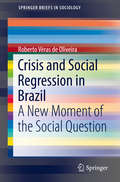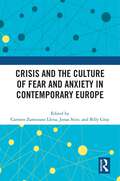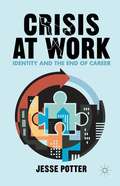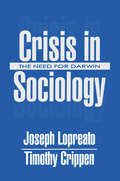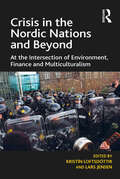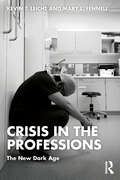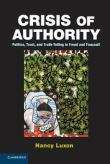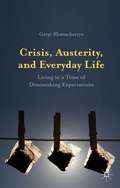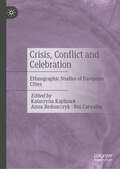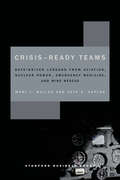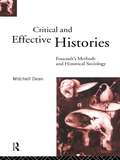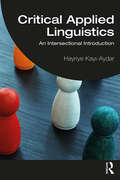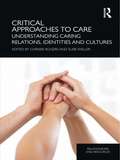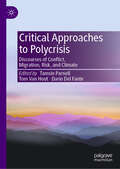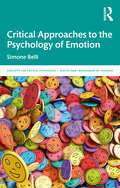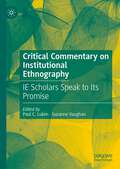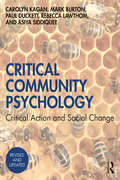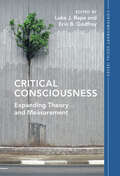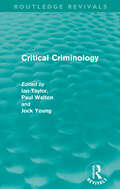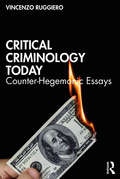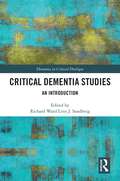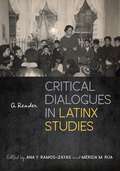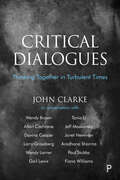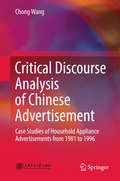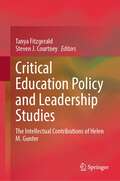- Table View
- List View
Crisis and Social Regression in Brazil: A New Moment of the Social Question (SpringerBriefs in Sociology)
by Roberto Véras de OliveiraThis is the first book published in English to present a concise but panoramic overview of the social, economic and political roots of the current Brazilian crisis. By situating former president Dilma Rousseff’s impeachment in the wider context of the historical struggle for social rights, citizenship and democracy in the country, the book provides a conceptual framework that will allow foreign readers to better understand the apparent contradiction of a rising regional power that all of a sudden entered in one of the worst economic, social and political crisis of its history. This book will be of interest to a wide range of social scientists (such as sociologists, economists, historians and political scientists) interested in labor and citizenship issues in developing countries like Brazil, as well as for social agents (from the public and private spheres) with practical involvement with such issues, such as trade unionists, leaders and advisors of business organizations, policy-makers, politicians, NGO activists and technicians.
Crisis and the Culture of Fear and Anxiety in Contemporary Europe
by Carmen Zamorano LlenaThe accruement of crises over the last two decades, with their particular manifestations in the European context, has evoked the feeling of living in exceptional times, as captured in the recurrent claim that we live in the "age of anxiety." The main aim of this collection is to analyse, from a multidisciplinary perspective, the causes and consequences of the current dominance of the discourse of fear, anxiety, and crisis through the experience of distinct and often interdependent moral panics in twenty-first-century Europe. With its multidisciplinary approach, this volume sheds light on the need to view the interrelationship between different crises and their associated affects as crucial in attaining a more nuanced understanding of the aetiology and effects of the current "age of anxiety." This multidisciplinary scrutiny of the interrelationship of twenty-first-century fears, anxiety and crises signals an original engagement with these complex phenomena in order to make their emergence and profound effects on contemporary society more comprehensible. The timeliness of the thematic focus and the rigorous in-depth analyses make this collection relevant to students and academics within the fields of sociology, literary and cultural studies, political science and anthropology, as well as to those in European studies and global studies.
Crisis at Work
by Jesse PotterThis book explores how we make sense of ourselves when work is precarious and intrinsically alienating. We know little about how this experience of work impacts the lives of men and women, and less about the way individuals understand themselves in the face of institutions and organizations from which they feel marginalized. Based on the narratives of men and women who underwent extraordinary work life changes, Crisis at Work examines how we negotiate greater meaning and fulfilment when our productive lives fail to sustain and satisfy. Reflecting a growing fracture between what we value, believe in, and are committed to and the degree to which work and career have become incapable of assuaging those desires, Potter examines how individuals attempt to assemble working-lives they find rich and rewarding and how that work is negotiated within the constraints and possibilities of the contemporary moment.
Crisis in Sociology: The Need for Darwin
by Joseph Lopreato Timothy CrippenCrisis in Sociology presents a compelling portrait of sociology's current troubles and proposes a controversial remedy. In the authors' view, sociology's crisis has deep roots, traceable to the over-ambitious sweep of the discipline's founders. Generations of sociologists have failed to focus effectively on the tasks necessary to build a social science. The authors see sociology's most disabling flaw in the failure to discover even a single general law or principle. This makes it impossible to systematically organize empirical observations, guide inquiry by suggesting falsifiable hypotheses, or form the core of a genuinely cumulative body of knowledge. Absent such a theoretical tool, sociology can aspire to little more than an amorphous mass of hunches and disconnected facts. The condition engenders confusion and unproductive debate. It invites fragmentation and predation by applied social disciplines, such as business administration, criminal justice, social work, and urban studies. Even more dangerous are incursions by prestigious social sciences and by branches of evolutionary biology that constitute the frontier of the current revolution in behavioral science. Lopreato and Crippen argue that unless sociology takes into account central developments in evolutionary science, it will not survive as an academic discipline. Crisis in Sociology argues that participation in the "new social science," exemplified by thriving new fields such as evolutionary psychology, will help to build a vigorous, scientific sociology. The authors analyze research on such subjects as sex roles, social stratification, and ethnic conflict, showing how otherwise disconnected features of the sociological landscape can in fact contribute to a theoretically coherent and cumulative body of knowledge.
Crisis in the Nordic Nations and Beyond: At the Intersection of Environment, Finance and Multiculturalism
by Lars Jensen Kristín LoftsdóttirWith discourses of ’crisis’ and ’disaster’ featuring strongly in contemporary discourses on contemporary society, this book brings together critical perspectives from across the humanities and social sciences to explore the idea of ’crisis’ as inherently related to power dynamics and the formation of different subjectivities and identities within the Nordic countries and globally. This volume emphasizes the importance of investigating the interrelationship of three crises - social, economic and environmental - as these address the interlinked surfaces of the same reality, and it examines the negative connotations of the notion of crisis, whilst also raising the question of when and why something becomes identified as crisis, and for whom. With chapters on media representations of crisis and the global context of crisis discourses, the crisis of national identities and their mobilization in response, and environmental crisis, as well as the interrelationship between the social and the environmental and the different positioning of individuals in relation to power, this volume offers an understanding of crisis as a multivocal symbol of the present. As such, it will appeal to scholars of sociology, anthropology, history, cultural studies, literature and political science.
Crisis in the Professions: The New Dark Age
by Kevin T Leicht Mary L. FennellCrisis in the Professions: The New Dark Age presents a wide, panoramic view into the state of modern professional work in the United States. Struggling labor markets, growing inequalities, and increasing amounts of cultural and political mistrust are but a few major changes undermining the people seen as essential in society and needed to compete in a globalized, highly skilled world. The authors explore this profound dilemma through a variety of methods, each one allowing them to identify significant areas of change and concern. They address macro-level social, political, and economic forces at the root of these changes and pair these explanations with illustrative vignettes of young, would-be professionals to paint a comprehensive, albeit complicated picture of professional work in the 21st century. Amid a backdrop of increasing globalization, technological advance, and cultural devaluation of expertise, the authors point attention to the mounting implications these shifts have for new generations of professionals and consider alternative models to address signs of precarity and instability within the professions. With piercing insight and compelling evidence, Crisis in the Professions probes deeply enough to stimulate scholars and researchers invested in the sociological study of work and provides a valuable, versatile read for advanced students in these areas as well.
Crisis of Authority
by Nancy LuxonContemporary social and political theory has reached an impasse about a problem that had once seemed straightforward: how can individuals make ethical judgments about power and politics? Crisis of Authority analyzes the practices that bind authority, trust, and truthfulness in contemporary theory and politics. Drawing on newly available archival materials, Nancy Luxon locates two models for such practices in Sigmund Freud's writings on psychoanalytic technique and Michel Foucault's unpublished lectures on the ancient ethical practices of "fearless speech," or parrhesia. Luxon argues that the dynamics provoked by the figures of psychoanalyst and truth-teller are central to this process. Her account offers a more supple understanding of the modern ethical subject and new insights into political authority and authorship.
Crisis, Austerity, and Everyday Life: Living in a Time of Diminishing Expectations
by Gargi BhattacharyyaWill austerity never end? This timely and insightful book argues that austerity seeks to set the terms of political and economic life for the foreseeable future, extending techniques of exclusion to ever-greater sections of the population.
Crisis, Conflict and Celebration: Ethnographic Studies of European Cities
by Katarzyna Kajdanek Anna Bednarczyk Rui CarvalhoThis book illuminates how the profound challenges faced by contemporary societies over the past few decades, encompassing climate change and other environmental risks, global health threats, warfare, and mass migration, manifest themselves in European cities. The chapters bring cutting-edge ethnographic studies which address these complex issues through three key conceptual dimensions of urban life: crisis, conflict, and celebration. The concept of crisis is critically explored in its various economic, political and cultural dimensions affecting urban residents in multiple social and spatial aspects of their lives. Crises often lead to conflicts, dynamic processes that give rise to interest groups and complex social landscapes of resistance. By examining conflicts in urban contexts, the book uncovers the power dynamics and vulnerabilities emerging during turbulent times. Crises and conflicts also present opportunities for urban transformation and regeneration, bringing underlying beliefs and norms into question, paving the way for new social dynamics within urban environments. These conflictual spaces can therefore become arenas for celebration of urbanity, where communities express resilience, cultural identity, and collective solidarity. As well as providing new insights into the present and future of European cities and the pivotal role of urban areas as centers of social change, contestation, and community-building, the book provides an important methodological contribution through innovative qualitative research in a diverse range of European urban areas.
Crisis-Ready Teams: Data-Driven Lessons from Aviation, Nuclear Power, Emergency Medicine, and Mine Rescue (High Reliability and Crisis Management)
by Mary Waller Seth KaplanPrepare any team for peak performance when crisis comes. Crisis-Ready Teams explains how any team, and any team leader, in any industry or sector, can prepare in advance to manage crises that suddenly pull people together to address high-magnitude events that could seriously harm their organizations. The book is based on extensive, unprecedented research on crisis team dynamics, key success behaviors, and why some teams perform so much better than others. Leading scholars Mary J. Waller and Seth A. Kaplan recorded and statistically analyzed audio and video recordings of hundreds of hours of crisis simulations involving flight crews, nuclear power plant control rooms, mine rescues, emergency room doctors and nurses, etc. Based on this empirical research, and other academic literature on how teams perform in crises, the authors show how crisis teams and leaders can cement crucial behaviors through attention to team composition and communication, especially in the first few minutes of a crisis. The book provides a valuable framework and research data for scholars studying crises and teams in organizations. It is also appropriate for MBA or executive education instruction on crisis management and leadership.
Critical And Effective Histories: Foucault's Methods and Historical Sociology
by Mitchell DeanFirst Published in 2004. Routledge is an imprint of Taylor & Francis, an informa company.
Critical Applied Linguistics: An Intersectional Introduction
by Hayriye Kayı-AydarThis highly accessible, up-to-date introduction provides an overview of critical applied linguistics through an intersectionality framework. The book reflects recent developments through a discussion and evaluation of key questions, diverse perspectives, and practices for social change. As it unpacks different forms of marginalization and privilege, it relates them to language use, critical pedagogies, and critical intersectional advocacy in applied linguistics. This book is a source of reference for all applied linguists; undergraduate/graduate students in applied linguistics, TESOL, and other relevant programs; classroom teachers; and language teacher educators. It aims to foster critical reflection, critical thinking, and intersectional advocacy. Examples, suggested readings, discussion questions, and questions for reflection not only help personalize the content but also enable the reader to further understand what motivates research, critical practice, and social action in critical applied linguistics.
Critical Approaches to Care: Understanding Caring Relations, Identities and Cultures (Relationships and Resources)
by Chrissie Rogers Susie WellerWhat does ‘care’ mean in contemporary society? How are caring relationships practised in different contexts? What resources do individuals and collectives draw upon in order to care for, care with and care about themselves and others? How do such relationships and practices relate to broader social processes? Care shapes people’s everyday lives and relationships and caring relations and practices influence the economies of different societies. This interdisciplinary book takes a nuanced and context-sensitive approach to exploring caring relationships, identities and practices within and across a variety of cultural, familial, geographical and institutional arenas. Grounded in rich empirical research and discussing key theoretical, policy and practice debates, it provides important, yet often neglected, international and cross-cultural perspectives. It is divided into four sections covering: caring within educational institutions; caring amongst communities and networks; caring and families; and caring across the life-course. Contributing to broader theoretical, philosophical and moral debates associated with the ethics of care, citizenship, justice, relationality and entanglements of power, Critical Approaches to Care is an important work for students and academics studying caring and care work in the fields of health and social care, sociology, social policy, anthropology, education, human geography and politics.
Critical Approaches to Polycrisis: Discourses of Conflict, Migration, Risk, and Climate
by Tom Van Hout Tamsin Parnell Dario Del FanteThis book critically examines how polycrisis is recontextualised and (ab)used in contemporary discourse from across Europe. The book brings together established and emerging researchers in the field of discourse studies from around the world to explore the accelerating interconnected challenges of climate change, conflict, risk, Brexit, democracy, COVID-19, the rising cost of living, and migration. Recognising that polycrisis is socially produced, constructed and dismantled through discourse, the authors contemplate the discursive manifestations of crisis. Falling under the banner of critical discourse studies (CDS), the methodological approaches are heterogeneous, including, but not limited to, corpus-assisted CDS and multimodal CDS. The data are equally varied, ranging from focus groups to no-war letters, media representations to environmental protection commercials. The volume provides a comprehensive consideration of how critical approaches to discourse can help to make sense of, resist, and respond to (poly)crisis, and it will be of interest to students and scholars working in the remit of discourse studies, with a particular interest in crisis communication.
Critical Approaches to the Psychology of Emotion (Concepts for Critical Psychology)
by Simone BelliThis fascinating book explores the different methodologies, resources and strategies that have been used to study emotion, and identifies emerging trends and research perspectives in the field. Emotion is a subject that has been thoroughly investigated in all fields of social and behavioural sciences. And yet the more we have attempted to individualize emotions and set limits that separate the different types of emotions, the more the subject has resisted these categorizations. Mapping the changes and diverse perspectives in the study of emotion, author Simone Belli explores how a critical psychology of emotion has emerged in order to answer this paradox, examining emotions within a social framework. Divided into five chapters, the book uses interdisciplinary critical approaches to cover everything from the interaction between emotion and language, to emotional contagion such as the spread of fear in a pandemic. There is also a particular focus on emotion analysis in digital environments, which have left a deep mark on our lives from the beginning of this century. Showcasing a selection of important investigations that have dealt with the study of emotions in society, Critical Approaches to the Psychology of Emotion is essential reading for students of critical social psychology, sociolinguistics, sociology, anthropology and philosophy.
Critical Commentary on Institutional Ethnography: IE Scholars Speak to Its Promise
by Paul C. Luken Suzanne VaughanThis edited volume gathers top scholars from across disciplines, generations, and countries to provide constructive commentary on the theory, methods and practices of institutional ethnography. These contributions explore themes of relevance to institutional ethnographers that are both enduring and newly emerging: how institutional ethnographers can take an expanded view of social institutions, how they might explore the dynamics of ruling relations over time, what results from understanding experience as dialogue (including internal or in-skull dialogue), the significance of “standpoint,” and the opportunities for institutional ethnographers to move beyond texts as they discover and describe social relations. A key aspect of Critical Commentary on Institutional Ethnography, and one that distinguishes it from others, is the forward-looking orientation of the authors. This perspective allows them to establish bridges between the institutional ethnography that has been developed heretofore and the potential that is looming for such a mode of inquiry into the social. As such, the book is both informative and inspirational.
Critical Community Psychology: Critical Action and Social Change (Bps Textbooks In Psychology Ser. #13)
by Mark Burton Carolyn Kagan Paul Duckett Rebecca Lawthom Asiya SiddiqueeThis accessible textbook draws upon progressions in academic, political and global arenas, to provide a comprehensive overview of practical issues in psychological work across a diverse range of community settings. Interest in community psychology, and its potential as a distinctive approach, is growing and evolving in parallel with societal and policy changes. Thoroughly revised and updated, this new edition covers crucial issues including decolonial approaches, migration, social justice, and the environmental crisis. It has a new chapter on archive research, working with data, policy analysis and development, to reflect the continuously developing global nature of community psychology. Key features include: Sections and chapters organised around thinking, acting and reflecting Case examples and reflections of community psychology in action Discussion points and ideas for exercises that can be undertaken by the reader, in order to extend critical understanding Aiming to provide readers with not only the theories, values and principles of community psychology, but also with the practical guidance that will underpin their community psychological work, this is the ideal resource for any student of community, social, and clinical psychology, social work, community practice, and people working in community-based professions and applied settings.
Critical Consciousness: Expanding Theory and Measurement (Contemporary Social Issues Series)
by Luke J. Rapa Erin B. GodfreyCritical consciousness represents the analysis of inequitable social conditions, the motivation to effect change, and the action taken to redress perceived inequities. Scholarship and practice in the last two decades have highlighted critical consciousness as a key developmental competency for those experiencing marginalization and as a pathway for navigating and resisting oppression. This competency is more urgent than ever given the current sociopolitical moment, in which longstanding inequity, bias, discrimination, and competing ideologies are amplified. This volume assembles leading scholars to address some of the field's most urgent questions: How does critical consciousness develop? What theories can be used to complement and enrich our understanding of the operation of critical consciousness? How might new directions in theory and measurement further enhance what is known about critical consciousness? It offers cutting-edge ideas and answers to these questions that are of critical importance to deepen our critical consciousness theory and measurement.
Critical Criminology (Routledge Revivals)
by Ian Taylor, Paul Walton and Jock YoungFirst published in 1975, this collection of essays expands upon the themes and ideas developed in the editors’ previous work, the visionary and groundbreaking text: The New Criminology. Directed at orthodox criminology, this is a partisan work written by a group of criminologists committed to a social transformation: a transformation to a society that does not criminalize deviance. Included are American contributions, particularly from the School of Criminology at Berkeley, represented by Hermann and Julia Schwendinger and Tony Platt, together with essays by Richard Quinney and William Chambliss. From Britain, Geoff Pearson considers deviancy theory as ‘misfit sociology’ and Paul Hirst attacks deviancy theory from an Althusserian Marxist position. The editors contribute a detailed introductory essay extending the position developed in The New Criminology, and two other pieces which attempt to continue the task of translating criminology from its traditional correctionalist stance to a commitment to socialist diversity and a crime-free set of social arrangements.
Critical Criminology Today: Counter-Hegemonic Essays
by Vincenzo RuggieroWhat survives of the notions, principles and values of critical criminology? Faced with contexts that could not be more dramatically different to those fostering critical approaches to crime and its control, what is left of the radical theories and practical initiatives that characterized it in the 1970s? This book argues that critical criminology today can be reimagined if new concepts are elaborated, which bring academic efforts close to the practices of social movements. Building on an original collection of anti-hegemonic essays focused on specific criminological areas, including femicide, organized crime, drug use, punishment, state-corporate terrorism and financial crime, this book identifies the radical potential inherent in the choice of areas, topics and variables that critical criminologists can address today. In discussing concepts of distance, power, mercy and troublemaking, this book considers the relationship between critical criminology, social justice and activism. An accessible and compelling read, this book will appeal to all those engaged with critical criminology, sociology and cultural studies.
Critical Dementia Studies: An Introduction (Dementia in Critical Dialogue)
by Richard WardThis book puts the critical into dementia studies. It makes a timely and novel contribution to the field, offering a provocative and thought-provoking critique of current thinking and debate on dementia. Collectively the contributions gathered together in this text make a powerful case for a more politically engaged, deconstructive and critical treatment of dementia and the systems and structures that currently govern and frame it. The book is interdisciplinary and draws together leading dementia scholars alongside dementia activists from around the world. It frames dementia as first and foremost a political category. The book advances both theoretical and methodological thinking in the field as well as sharing learning from empirical research. Outlining the limits to existing efforts to frame and theorise the condition it proposes a new critical movement for the field of dementia studies and practice. The book will be of direct interest to researchers and scholars in the field of dementia studies and wider fields of health, disability and care. It will provide a novel resource for students and practitioners in the fields of dementia, health care and social care. The book also has implications for dementia policymaking, commissioning and community development.
Critical Dialogues in Latinx Studies: A Reader
by Ana Y. Ramos-Zayas and Mérida M. Rúa**WINNER, D. Scott Palmer Prize for Best Edited Collection, given by the New England Council of Latin American Studies**Introduces new approaches, theoretical trends, and understudied topics in Latinx StudiesThis groundbreaking work offers a multidisciplinary, social-science oriented perspective on Latinx studies, including the social histories and contemporary lives of a diverse range of Latina and Latino populations. Editors Ana Y. Ramos-Zayas and Mérida M. Rúa have crafted an anthology that is unique in both form and content. The book combines previously published canonical pieces with original, cutting-edge works created for this volume. The sections of the text are arranged thematically as critical dialogues, each with a brief preface that provides context and a conceptual direction for the scholarly conversation that ensues. The editors frame the volume around the “humanistic social sciences,” using the term to highlight the historical and social contexts under which expressive cultural forms and archival records are created.Critical Dialogues in Latinx Studies masterfully sheds light on the diversity and complexity of the everyday lives of Latinx populations, the political economic structures that shape enduring racialization and cultural stereotyping, and the continuing efforts to carve out new lives as diasporic, transnational, global, and colonial subjects.
Critical Dialogues: Thinking Together in Turbulent Times
by John ClarkeIn this engaging and original book, John Clarke is in conversation with twelve leading scholars about the dynamics of thinking critically in the social sciences. The conversations range across many fields and explore the problems and possibilities of doing critical intellectual work in ways that are responsive to changing conditions. By emphasizing the many voices in play, in conversation with, as well as against, others, Clarke challenges the individualising myth of the heroic intellectual. He underlines the value of thinking critically, collaboratively and dialogically. The book also provides access to a sound archive of the original conversations.
Critical Discourse Analysis of Chinese Advertisement: Case Studies of Household Appliance Advertisements from 1981 to 1996
by Chong WangThis book reflects the chronological changes in Chinese cultural values, social relations, economy and politics by critically analyzing the Chinese advertising discourse. The work is based on research into the ideological values portrayed in Chinese household appliance advertisements in the 1980s - 1990s. The analytical framework covers a variety of methods: critical discourse analysis, chronological analysis, visual and verbal analysis, and qualitative and quantitative analysis. The findings suggest that ideological values consciously or unconsciously manifested by the visual and verbal devices in the Chinese advertisements moved in a pattern from simplicity to diversity, from being politically-oriented to being economically and profit-oriented, from conservatism to globalization and westernization, in keeping with the progression of the Chinese economic reform. The findings further indicate that the ideological values in the Chinese household appliance advertisements are embedded in the advertising language and illustrations. Lastly, the work reveals the reality of Chinese politics, economy and society at a time when China experienced the growth of the market economy and evolution of Chinese mainstream ideologies, and demonstrates the impacts of these changes on the ideological meanings in advertisements. This book will help readers discover the more profound meanings behind the superficial content of Chinese advertisements.
Critical Education Policy and Leadership Studies: The Intellectual Contributions of Helen M. Gunter
by Tanya Fitzgerald Steven J. CourtneyThis edited collection is a Festschrift to Helen M. Gunter, a leading scholar in the field of education policy and leadership. We draw on the concept of the Festschrift as a collection of papers, or chapters, that recognise, honour, and celebrate the work and contributions of an esteemed academic. Gunter’s work has opened up the field of critical education policy and leadership studies and provoked, if not revitalised, scholarly thinking about the origins, structures, patterns and impact of the field. Gunter’s personal commitment to intellectual leadership of the field and public education resonates across all her scholarly works. The core intention of this unique collection is to recognise Gunter’s scholarly contributions as an academic, practitioner and public intellectual. Invited authors have been asked to reflect critically on ways in which Gunter’s work and intellectual support have influenced their own research, teaching and academic engagement. In their reflections, contributors not only speak to the intellectual work of Gunter but suggest how they have taken this work forward and how this has advanced the field of education as well as the production of knowledge.
